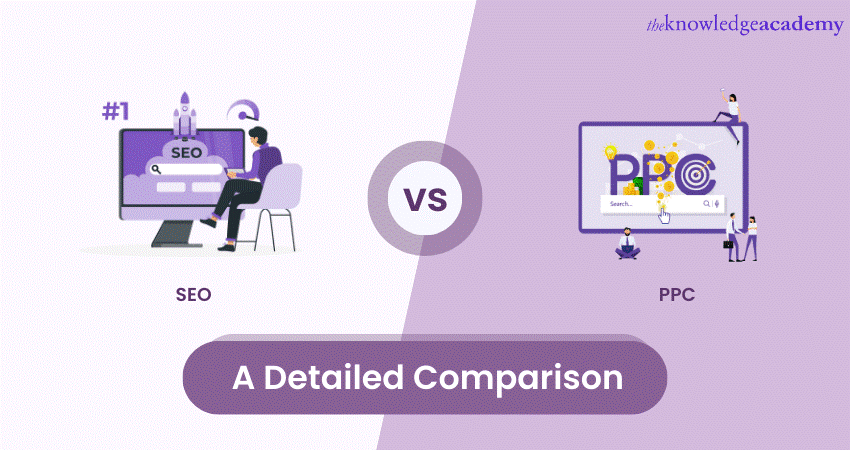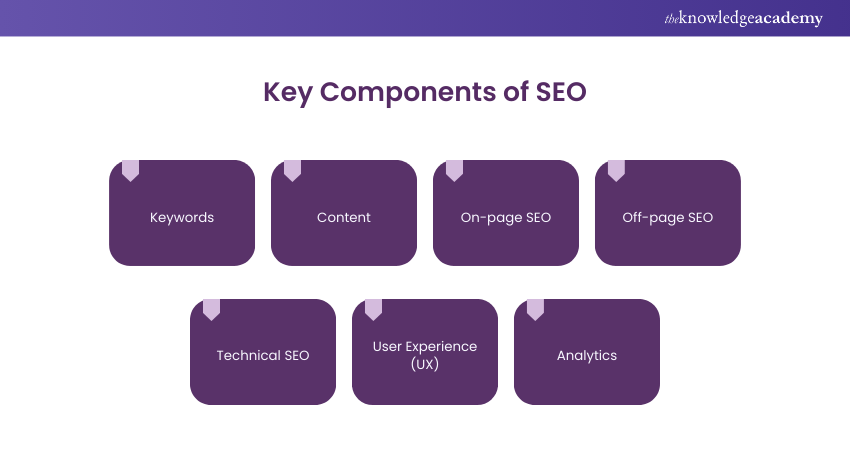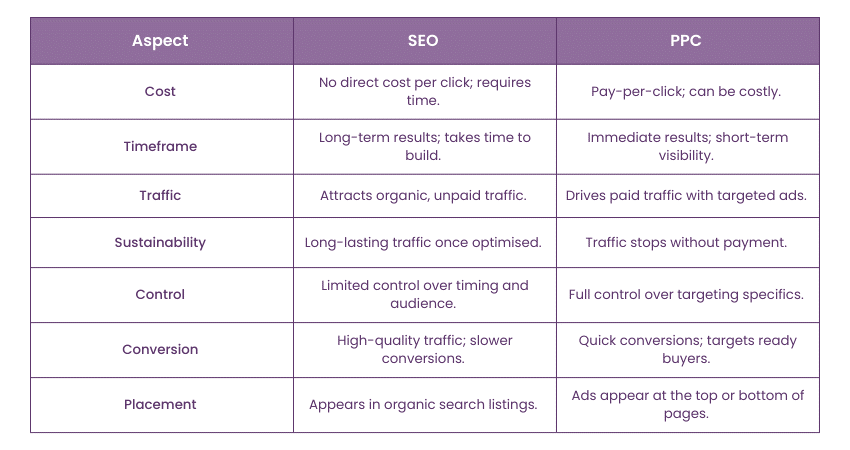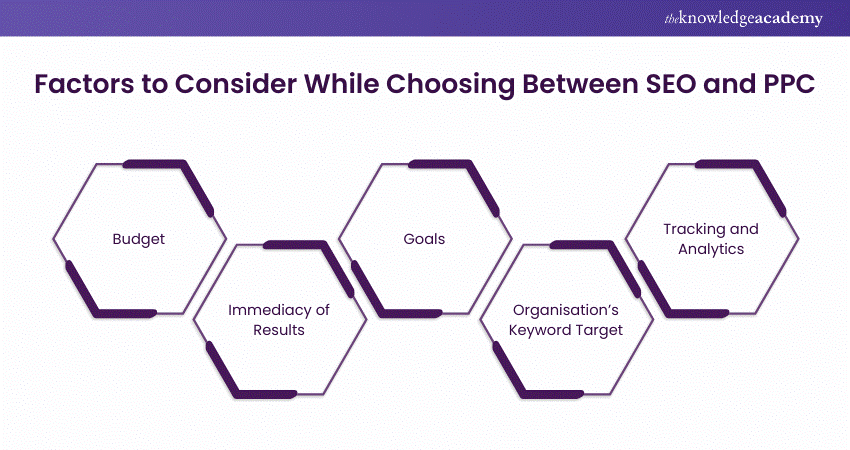We may not have the course you’re looking for. If you enquire or give us a call on +44 1344 203 999 and speak to our training experts, we may still be able to help with your training requirements.
We ensure quality, budget-alignment, and timely delivery by our expert instructors.

In today's digital world, businesses are always seeking ways to enhance their web presence and attract more customers. Two of the most popular techniques are SEO and PPC. But how do you decide which is best for your business? In this blog, we dive into "SEO vs PPC," breaking down their key differences and unique advantages.
Whether you're aiming for long-term growth or immediate results, understanding these strategies can help you make informed decisions. Get ready to unlock the secrets of these strategies and discover how they can work together to supercharge your online presence!
Table of Contents
1) What is SEO?
2) Key Components of SEO
3) What is PPC?
4) Key Components of PPC
5) Key Differences Between SEO and PPC
6) SEO vs PPC: Which One to Choose?
7) Conclusion
What is SEO?
SEO is an acronym for Search Engine Optimisation which is a fundamental aspect of Digital Marketing that focuses on improving the website’s visibility and ranking in Search Engine Results Pages (SERPs). It involves implementing various strategies and techniques to enhance the website’s relevance and authority in the eyes of search engines.
SEO aims to optimise the website’s structure, content, and other elements to align with the algorithms used by Google, Bing, and Yahoo. By doing so, SEO targets to increase the website’s organic (non-paid) traffic by appearing higher in the search results for relevant queries.
Key Components of SEO
Understanding the components of SEO is essential for improving your website's visibility and attracting more visitors. Here are some of them:

a) Keywords: These are the words and phrases people type into search engines. Using the correct keywords on your website helps search engines know what your site is about.
b) Content: High-quality, relevant content is crucial. This includes blog posts, articles, videos, and more. Good content answers visitors' questions and keeps them engaged.
c) On-page SEO: This involves optimising individual pages on your website. It includes using keywords in the right places, like titles and headers, and making sure your site is easy to navigate.
d) Off-page SEO: This focuses on building your website's reputation. It includes getting other websites to link back to yours, which informs search engines that your site is trustworthy and valuable.
e) Technical SEO: This involves optimising the backend of your website.
It involves making sure your website loads fast, works on mobile devices and is easy for search engines to find and understand.
f) User Experience (UX): A good User Experience means your site is easy to use and provides value to visitors. Search engines prefer sites that people enjoy using.
g) Analytics: Regularly checking your website's performance helps you understand what's working and what needs improvement. Tools like Google Analytics help you track your progress.
Take your SEO to the next level! Download the Semantic SEO Guide now and start applying advanced semantic SEO techniques for superior search performance.
What is PPC?
PPC, which stands for Pay-Per-Click, is a digital advertising model. Here, advertisers must pay a fee each time their ad is clicked. It is a form of online advertising that aims to drive the target traffic to a website or landing page.
Unlike organic Search Results, achieved through SEO efforts, it allows advertisers to place ads directly on SERPs, social media platforms, or other websites. Advertisers bid on specific keywords or target audience demographics, and their ads are displayed to users who enter relevant search queries or meet the specified criteria.
Key Components of PPC
The knowledge of key components of PPC is crucial for running successful online advertising campaigns and maximising your return on investment. Some of them are:
a) Keywords: Selecting the right keywords ensures your ads appear in relevant searches, attracting potential customers who are looking for your products or services.
b) Ad Copy: Crafting compelling ad copy that grabs attention and encourages clicks is essential for driving traffic to your website.
c) Landing Pages: Optimised landing pages are crucial for converting visitors into customers. It provides a seamless and relevant experience after they click on your ad.
d) Bid Strategy: Choosing the right bid strategy helps control your ad spending and achieve your advertising goals, whether it's maximising clicks, impressions, or conversions.
e) Targeting: Precise targeting ensures your ads reach the right audience, using factors like location, demographics, and interests to focus on potential customers.
f) Ad Extensions: Using ad extensions enhances your ads by providing additional information and links, increasing their visibility and effectiveness.
g) Analytics and Tracking: Monitoring how your PPC campaigns are doing with analytics and tracking tools helps you see what’s working and what’s not. This information lets you adjust your strategy to get better results over time.
Key Differences Between SEO and PPC
Here are the key differences:

Cost
With SEO, you're working to improve your website's ranking in search results without paying directly for clicks. It requires time and effort to optimise your site, but once it's done well, it doesn’t cost extra for traffic.
On the other hand, with PPC, you pay each time someone clicks on your ad. This means you can get quick visibility, but it can become expensive, especially if many people click on your ads.
Timeframe
Building SEO takes time. You might not see results immediately, but once your site ranks well, it can keep attracting visitors over time. On the other hand, PPC provides instant results. Once you start a campaign, your ads can appear immediately, but they only stay visible as long as you're paying for them.
Traffic
SEO aims to attract people naturally by having your site appear in regular search results. It focuses on getting visitors through unpaid search engine rankings.
In contrast, PPC drives traffic by showing your ads to people. It focuses on paid search results, where your ads appear based on specific keywords.
Sustainability
Once you’ve optimised your site, it can continue to draw in visitors without ongoing costs. The results are more lasting, even if you pause your efforts. On the other hand, PPC brings traffic as long as you keep paying for ads. Once you stop paying, the traffic stops immediately.
Control
With SEO, you optimise your site to rank for relevant searches. You don’t have control over when it appears, but you work on making your site more attractive to search engines.
In contrast, PPC gives you control over who sees your ads. You can target specific audiences, locations, and times, making it easier to reach the right people.
Conversion
SEO brings in organic traffic that might take time to convert, but these visitors are often looking for information or solutions. This leads to high-quality traffic.
On the other hand, PPC can drive quick conversions by targeting people who are ready to take action. It’s effective for attracting buyers looking for specific products or services.
Placement
SEO results show up in the organic search listings, typically below the ads. These are the standard search results that users trust for information.
In contrast, PPC ads appear at the top or bottom of search results pages. They are marked as ads and are shown prominently to attract clicks.
SEO vs PPC: Which One to Choose?
Choosing between SEO and PPC depends on several key factors. Each has its own benefits and can work well together in a Digital Marketing strategy. Here are some factors to help you decide which is right for you.

Budget
SEO is a long-term investment with lower ongoing costs, making it more cost-effective over time. However, it requires patience and continuous effort to see significant results. In contrast, PPC requires you to pay for each ad click, offering immediate visibility and quick results. However, it can be expensive for competitive keywords. Consider your budget to decide which approach best fits your financial resources.
Immediacy of Results
PPC is a suitable option if you’re looking for immediate visibility and quick results. With PPC, you can launch campaigns and instantly drive targeted traffic to your website. Conversely, SEO takes consistent effort and patience to achieve higher organic rankings. Consider whether you have the time to invest in SEO or need immediate results with PPC.
Goals
SEO can generate consistent organic traffic, even with reduced efforts in the future. Conversely, PPC is more suitable for short-term goals, specific promotions, or seasonal campaigns. It provides immediate visibility and quick results, but its impact isn’t the last longing if no ongoing investment exists.
Organisation’s Keyword Target
To optimise your website, SEO provides specific keywords, improving your visibility in organic search results. While it provides some level of targeting based on keywords, PPC offers more granular targeting options. If precise audience targeting is crucial for your marketing strategy, PPC may be preferred.
Tracking and Analytics
SEO and PPC provide data and insights to measure the effectiveness of your campaigns. SEO allows you to track organic traffic, keyword rankings, and user engagement metrics. PPC Tools are used to monitor clicks, impressions, conversions, and other valuable metrics. Consider which type of data is more important for your decision-making and optimisation processes.
Learn how to run PPC campaigns with our Pay Per Click (PPC) Training – Join today!
Conclusion
Both SEO and PPC are valuable strategies in Digital Marketing, each with its strengths and weaknesses. SEO is ideal for building long-term, sustainable traffic and is more cost-effective over time, while PPC offers quick results and precise targeting. When considering "SEO vs PPC," think about your goals, budget, and timeline to decide which is best for you. Combining both strategies can provide a balanced approach, helping you maximise your reach and achieve your marketing objectives.
Learn the skills to analyse data-driven metrics with our Web Analytics Course – Join today!
Frequently Asked Questions
How does SEO Impact PPC?

SEO and PPC both work to improve your online marketing strategy. When your website ranks in organic search results through SEO, it can increase your brand's credibility, which can positively impact your PPC campaigns.
How is Ranking Different When Comparing PPC and SEO?

With PPC, your ads appear at the top or bottom of search results pages immediately, but you pay for each click. SEO focuses on improving your website's organic ranking. While PPC provides instant visibility, SEO builds long-term authority.
What are the Other Resources and Offers Provided by The Knowledge Academy?

The Knowledge Academy takes global learning to new heights, offering over 3,000 online courses across 490+ locations in 190+ countries. This expansive reach ensures accessibility and convenience for learners worldwide.
Alongside our diverse Online Course Catalogue, encompassing 19 major categories, we go the extra mile by providing a plethora of free educational Online Resources like News updates, Blogs, videos, webinars, and interview questions. Tailoring learning experiences further, professionals can maximise value with customisable Course Bundles of TKA.
What is The Knowledge Pass, and How Does it Work?

The Knowledge Academy’s Knowledge Pass, a prepaid voucher, adds another layer of flexibility, allowing course bookings over a 12-month period. Join us on a journey where education knows no bounds.
What are Related Courses and Blogs Provided by The Knowledge Academy?

The Knowledge Academy offers various Marketing Courses, including the Pay Per Click (PPC) Course, Web Analytics Course, and Conversion Rate Optimisation Course. These courses cater to different skill levels, providing comprehensive insights into Marketing Campaign.
Our Digital Marketing Blogs cover a range of topics related to Search Engine Optimisation, offering valuable resources, best practices, and industry insights. Whether you are a beginner or looking to advance your SEO skills, The Knowledge Academy's diverse courses and informative blogs have got you covered.
Upcoming Digital Marketing Resources Batches & Dates
Date
 Pay Per Click (PPC) Training
Pay Per Click (PPC) Training
Fri 11th Apr 2025
Fri 13th Jun 2025
Fri 15th Aug 2025
Fri 10th Oct 2025
Fri 12th Dec 2025






 Top Rated Course
Top Rated Course



 If you wish to make any changes to your course, please
If you wish to make any changes to your course, please


